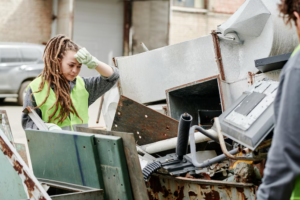
There’s more to overfilling a dumpster than simply piling waste until it topples over. What seems like efficient use of space can quickly backfire when the lid won’t close, or worse, when materials spill out during transport. Overflowing isn’t just a visual issue—it’s a safety hazard, a regulatory violation, and often a financial penalty waiting to happen. The line between full and overfull isn’t blurry—it’s strict and enforced.
Too often, people assume it’s acceptable to fill a dumpster past its rim, especially during big cleanouts or construction projects. That assumption gets expensive quickly. Dumpster rental services can refuse pickup or charge extra for overages. Understanding what constitutes “full” and respecting those limits avoids unnecessary trouble. Every load has a legal weight and height boundary, and staying within it is non-negotiable.
The Weight Limit Myth That Trips People Up
Many people see a dumpster and think it’s just a matter of fitting everything inside. They focus on volume rather than weight, thinking they can load it up to the brim without a problem. However, weight limits are often more critical than you might realize. Certain materials—such as wet wood, concrete, broken drywall, and even old appliances—are extremely heavy, and before you know it, the weight of the items you’re throwing away could surpass the legal limit.
Dumpster trucks are designed to handle specific weight limits for a reason. If you exceed that weight limit, the truck might not even be able to lift the dumpster, or worse, you might cause damage to the equipment. Plus, many rental agreements explicitly include clauses about weight limits, and violating them could result in hefty fines or surcharges. So, always double-check your dumpster’s weight limit and plan your disposal accordingly.
Strategic Dumpster Loading Prevents Overflow
Imagine you’re preparing for a long road trip with only one suitcase to pack. If you just start tossing things in, you’re bound to end up with a messy, disorganized bag that’s difficult to close. Dumpster loading is no different—it requires careful planning and strategy. The goal is to maximize space without overloading the bin, ensuring that everything fits neatly and safely. Start with flat items like drywall or large sheets of cardboard, then work your way up with irregularly shaped materials like furniture or odd bits of construction debris.
If possible, break large items into smaller pieces to prevent wasted space. Heavier materials should be evenly distributed throughout the dumpster to avoid creating an imbalanced load. A well-packed dumpster is not only easier to handle but also safer for everyone involved. Organizing your load thoughtfully helps avoid overflow, makes for a smoother pickup, and ensures you stay within your weight and volume limits.

Why Hazardous Waste Should Never Be Used as Filler
Tossing hazardous waste, such as old paint cans, batteries, or chemicals, into your dumpster may seem like a quick fix, but it’s one of the worst things you can do. These substances are not just potentially harmful to the environment; they can also pose serious risks to waste facility workers who might have to handle them improperly. Many items, including paint, oils, solvents, and certain cleaners, contain chemicals that can leak into the soil, contaminating local groundwater supplies.
Additionally, these substances are often volatile and can ignite or cause toxic reactions when exposed to heat, pressure, or other waste materials. The disposal of hazardous waste is regulated, and special procedures exist to safely get rid of these items. By sneaking hazardous waste into a general dumpster, you risk significant fines, damage to the environment, and the health of those around you. Always check with your provider and follow the proper disposal methods for hazardous materials.
How Rental Duration Influences Overfilling Tendencies
While it may seem convenient to extend your dumpster rental period for an indefinite amount of time, doing so can actually increase the chances of overfilling. The longer a dumpster sits on your property, the more likely it becomes a catch-all for anything people can’t immediately dispose of. A neighbor might sneak in an old chair, your kids might toss in broken toys, or you might even find random bags of garbage accumulating around the bin. This extended period of accumulation encourages a “one more item won’t hurt” mentality.
But over time, that mentality leads to disorganization, clutter, and eventual overfilling. The risk of exceeding weight or volume limits also grows, and you might forget exactly what’s buried beneath the pile. Short, efficient rental periods encourage a more focused cleanup effort and reduce the temptation to keep adding until the bin is overflowing. By sticking to a tight timeline, you’ll not only save money but also keep the project on track.
The High Cost of Ignoring Local Disposal Regulations
Each city and municipality has its own set of rules and regulations regarding waste disposal, and failing to comply with these local laws can lead to significant financial consequences. In many cases, local regulations will dictate the size and type of dumpster you can rent, how full it can be, and where it can be placed. Overfilling a dumpster, especially if it’s on public property or in a high-traffic area, can lead to fines, citations, or even orders for removal. In some cases, you could face legal action if you’re found violating waste management policies.
The cost of a citation could far exceed the price of a second dumpster or a more appropriate disposal plan. Local authorities take overfilling seriously, as it can cause environmental hazards, traffic hazards, or interference with regular waste collection schedules. By respecting local rules and planning your disposal accordingly, you not only avoid fines but also contribute to the smooth functioning of your community’s waste management system.
Overfilling Increases Injury Risks for Everyone Involved
Top-Heavy Structure Increases Risk of Unbalanced Load
Overfilling a dumpster causes an unbalanced load, which can shift during transportation. As the items move, the weight distribution changes, making the bin harder to control. This shift can result in dangerous situations where debris falls out unexpectedly. This imbalance can also lead to accidents during the unloading process, putting workers and bystanders at risk.
Sharp Debris Poses Immediate Injury Risk
When a dumpster is overfilled, sharp items like nails, broken glass, or metal pieces can protrude or shift. This exposes anyone nearby to injury, whether they are unloading the bin, walking past it, or handling the dumpster in any way. Even a small piece of protruding debris can cause cuts or punctures, increasing the potential for accidents on-site.
Strain on Equipment and Malfunctioning Lifting Mechanisms
Dumpsters are designed to carry a specific weight capacity. Overfilling a dumpster puts unnecessary stress on the lifting equipment, increasing the risk of malfunction. If the truck’s lift mechanism is forced to carry more weight than it was built to handle, it can break down or fail entirely, leading to costly delays and potential repair fees for the rental company.
Renting a Second Dumpster Beats Overloading the First
At first glance, renting a second dumpster might seem like an unnecessary expense. However, when you factor in the potential costs of overfilling or damaging the equipment, a second dumpster often ends up being the more economical choice. Overloading a single dumpster can result in overage charges, fines for exceeding weight limits, or delays in removal.
If you find yourself in a situation where your project has grown larger than expected—say, you started with a kitchen remodel that turned into a full home cleanout—trying to cram everything into one dumpster can quickly lead to problems. A second dumpster provides extra space to separate materials, keep your load balanced, and avoid the stress of overfilling. It can also help you avoid potential safety hazards associated with a too-heavy, unbalanced load. Renting a second dumpster might feel like an extra cost, but it could save you from higher fees, logistical headaches, and long-term frustrations.
Dumpster Provider Makes All the Difference
One of the most common mistakes renters make is assuming they’re entirely on their own once the dumpster is delivered. The truth is, your dumpster provider is a valuable resource in helping you avoid common pitfalls, like overfilling or breaking the terms of your agreement. Before you start loading, take a few minutes to talk to your provider. Explain the nature of your project, ask about weight limits, and clarify any potential issues with your rental.
If you’re unsure about specific items or how best to load the dumpster, don’t hesitate to ask for advice. A good dumpster provider will be more than happy to offer suggestions and guide you through the process. Open communication ensures that there are no surprises when it’s time for pickup and that everyone is on the same page regarding the terms of the agreement. It also gives you a chance to double-check any fees, weight allowances, or special disposal rules that might apply to your particular project.
Conclusion
Respecting dumpster limits isn’t just about avoiding fees—it’s about keeping neighborhoods safe, services efficient, and cleanup projects manageable. Overfilling causes delays, risks penalties, and invites hazards that can derail even the most organized plans. Staying informed, planning your load, and choosing the right dumpster size from the start can make all the difference between a smooth operation and an expensive mess.
If you’re in the Chicago area and looking for reliable dumpster rental and junk removal, reach out to 606 Junk Removal and Dumpster Rental. Their team understands local regulations, offers a variety of dumpster sizes, and provides expert guidance to ensure you avoid common mistakes like overfilling. Contact them at 773-412-4902 or via email at info@606junk.com for efficient, stress-free service tailored to your specific needs. Whether it’s a weekend renovation or a full-scale property cleanout, trust the pros who know how to handle waste the right way.
